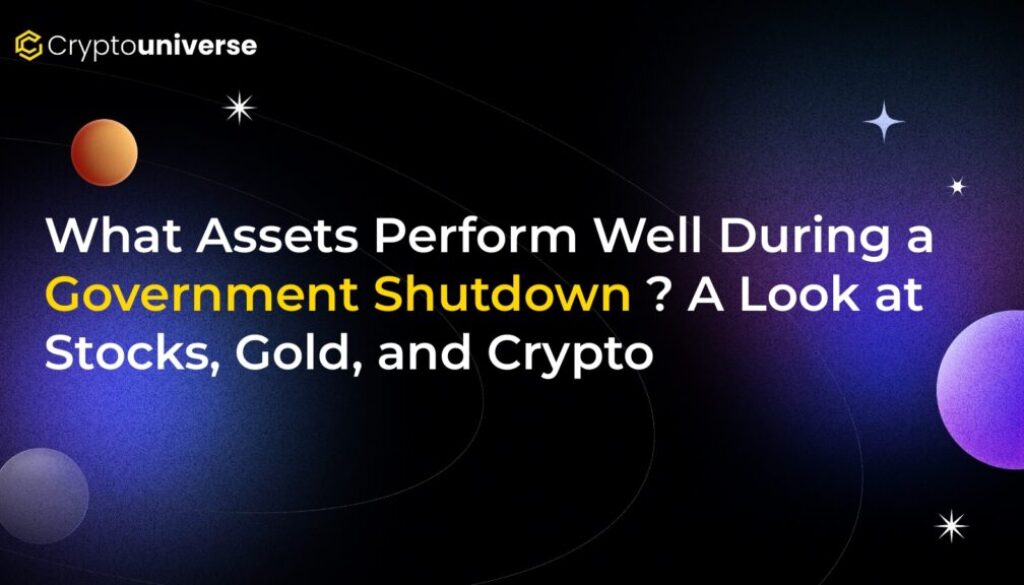What Assets Perform Well During a Government Shutdown? A Look at Stocks, Gold, and Crypto

What is a Government Shutdown and Why Should Investors Care?
Political headlines can often feel like noise, but when talk of a government shutdown begins, investors start paying attention. In simple terms, a government shutdown happens when Congress fails to pass funding legislation, forcing non-essential federal agencies to temporarily close their doors. This creates a ripple effect of uncertainty across the economy.
For investors, a shutdown introduces several challenges. Key economic data releases, like inflation and employment reports that markets rely on, can be delayed. It also raises questions about economic stability and consumer confidence. The big question on everyone’s mind is: how will this political standoff affect my portfolio, and more specifically,
The Traditional Playbook: How Stocks and Gold React
Historically, the stock market’s reaction to government shutdowns has been surprisingly muted, especially for short-lived events. Since 1977, the U.S. has seen around 20 shutdowns, with an average length of just over a week. In most cases, the market has shrugged them off as temporary political theater.
However, prolonged shutdowns are a different beast. The longest shutdown in U.S. history, a 35-day event in 2018-2019, offers a fascinating case study. Counter-intuitively, the S&P 500 actually rose more than 10% during that period. This suggests that while shutdowns create uncertainty, they have never single-handedly caused a recession or a market crash.
When investors get nervous, they often turn to traditional “safe-haven” assets. Gold is the classic example. Here’s why:
- Store of Value: Gold has been considered a reliable store of value for thousands of years.
- Hedge Against Uncertainty: During times of political or economic turmoil, investors often buy gold to protect their wealth from currency devaluation and market volatility.
While a shutdown might trigger a temporary flight to safety, analysts often see any resulting market dip as a potential buying opportunity for high-quality stocks rather than a reason to panic.
The Crypto Angle: A New Safe Haven?
In the modern financial landscape, traditional assets aren’t the only option. The rise of cryptocurrency, particularly Bitcoin, has introduced a new contender for the “safe-haven” title. So, how might digital assets fare during a government shutdown?
Bitcoin: The Digital Gold Narrative
Bitcoin’s core design makes it an intriguing asset during periods of government instability. Proponents point to several key features:
- Decentralization: Bitcoin operates on a global network, free from the control of any single government or central bank. A shutdown in one country has no direct impact on its operations.
- Fixed Supply: Unlike fiat currencies that can be printed at will, there will only ever be 21 million Bitcoin, making it a hedge against inflation and government-induced currency debasement.
- Non-Sovereign Asset: It acts as a check and balance against the traditional financial system. A government shutdown can highlight the system’s fragilities, potentially driving more people to consider decentralized alternatives.
However, the argument isn’t one-sided. In a major “risk-off” event where investors sell assets to raise cash, Bitcoin could still be treated as a high-risk tech asset and sell off alongside the Nasdaq. Its performance often depends on whether investors view it as a speculative tech play or a true store of value.
Altcoins and Market Volatility
Assets like Ethereum and other altcoins are generally considered higher on the risk spectrum. In a period of uncertainty, they would likely follow Bitcoin’s lead but with amplified volatility. If Bitcoin rallies on a safe-haven narrative, altcoins could see significant gains. Conversely, if Bitcoin sells off, altcoins would likely fall even harder.
Stablecoins: The Unsung Hero of Uncertainty
Often overlooked in the price speculation conversation are stablecoins like USDC and USDT. These digital assets are pegged to a fiat currency, typically the U.S. dollar, and are designed to maintain a stable value.
During a government shutdown and the resulting market choppiness, stablecoins serve a crucial purpose. They allow investors to:
- Reduce Risk: Move out of volatile assets like stocks or cryptocurrencies without completely exiting the digital ecosystem.
- Maintain Liquidity: Keep funds ready to deploy quickly to capitalize on buying opportunities once the dust settles.
- Act as a Digital Dollar: They provide the stability of cash but with the speed and efficiency of the blockchain.
Conclusion: Building a Resilient Portfolio
So, what assets perform well during a government shutdown? The answer isn’t black and white. Historically, short-term shutdowns are minor market events. A prolonged shutdown, however, could test investor confidence and lead to volatility.
While gold remains a trusted safe haven, Bitcoin is emerging as a compelling, albeit more volatile, alternative for those hedging against systemic and political risk. For those already in the crypto space, stablecoins offer a powerful tool for managing risk and maintaining liquidity.
Ultimately, navigating political uncertainty comes down to diversification and a clear understanding of your own risk tolerance. A well-balanced portfolio containing a mix of traditional and digital assets may be the best strategy to weather any storm, whether it originates on Wall Street or in Washington D.C.


